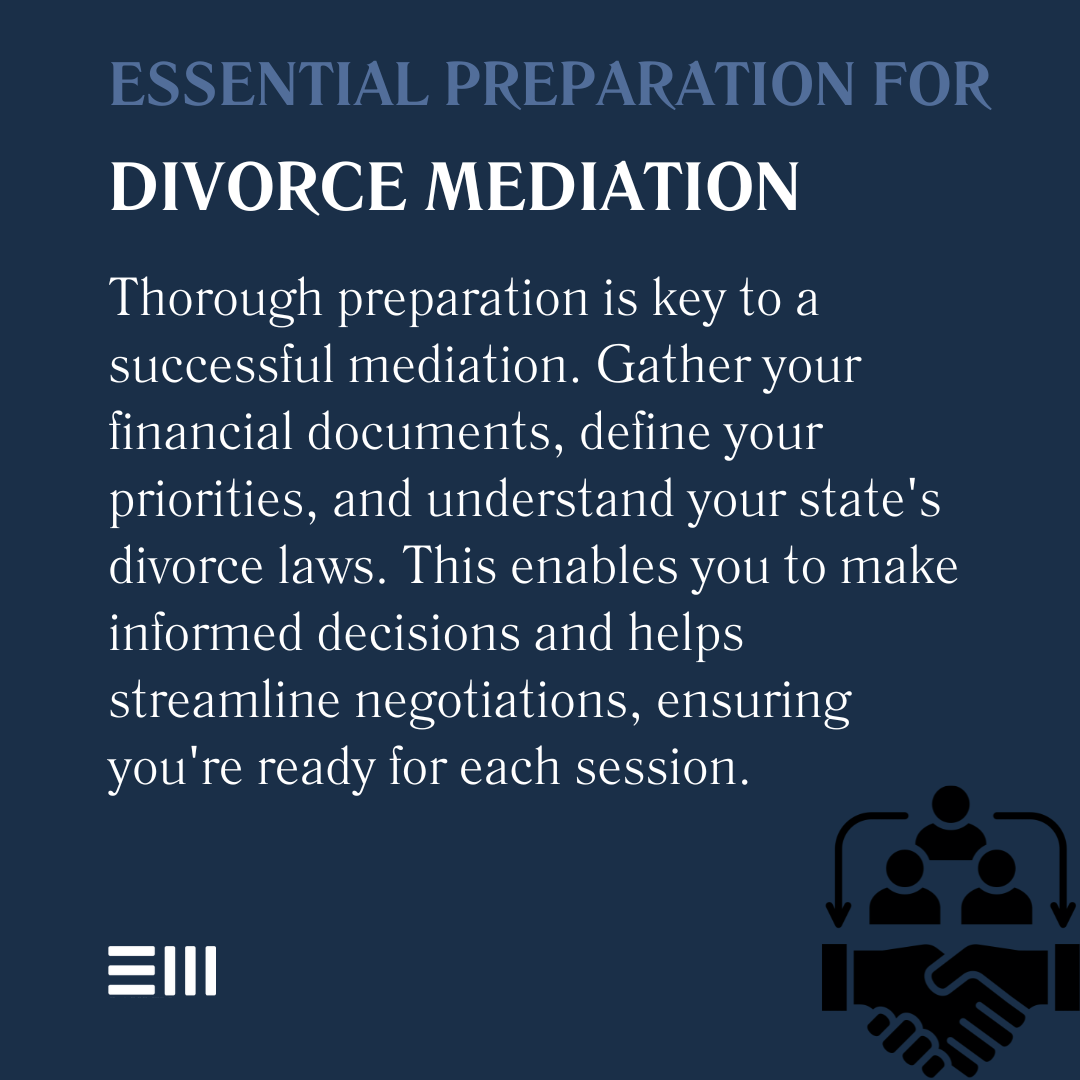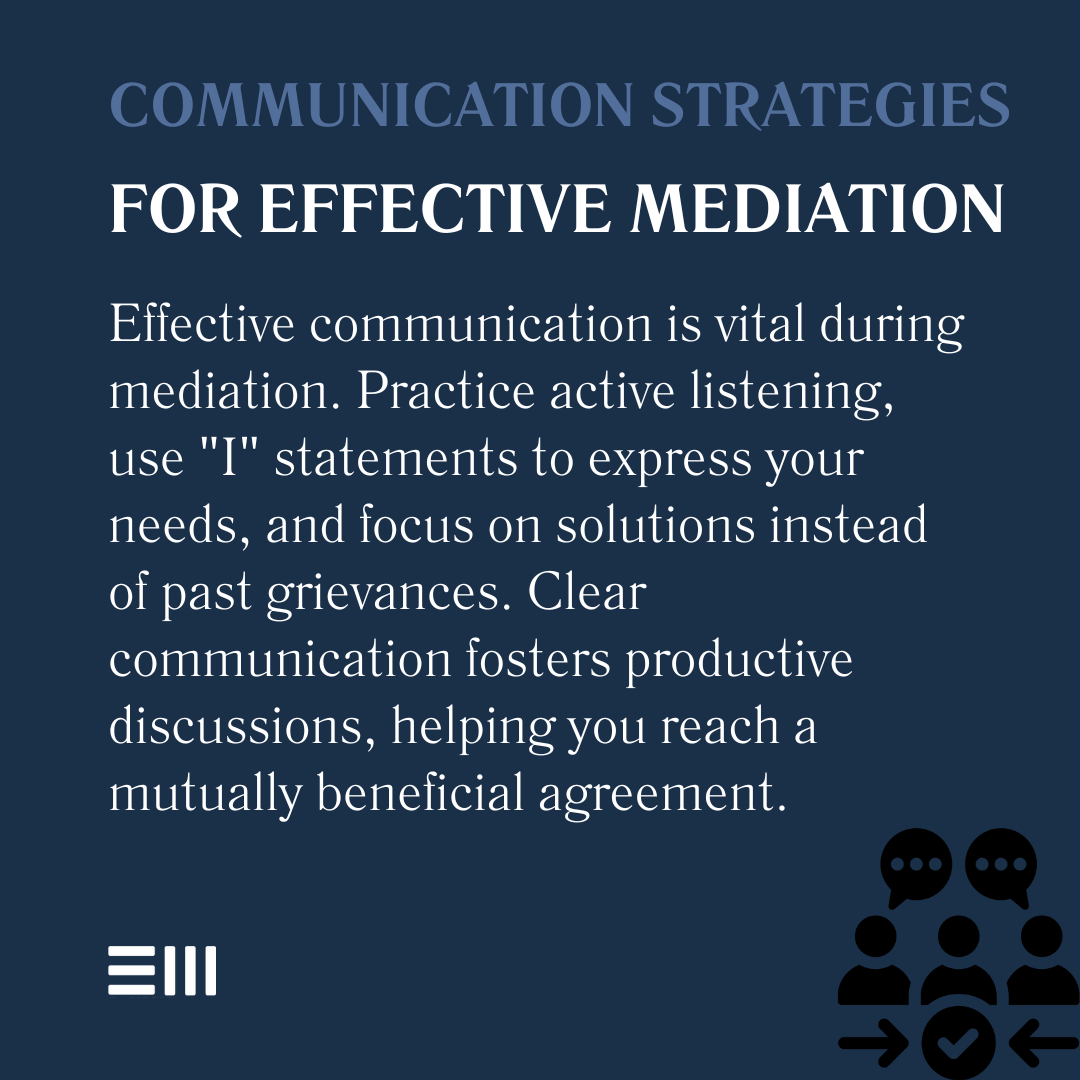Nearly 80% of divorce mediations reach a successful agreement.
Yet many people enter mediation feeling uncertain and unprepared, not realizing that their approach during these sessions can significantly impact their future.
Divorce mediators report that participants who understand the process are three times more likely to reach mutually beneficial agreements.
Understanding the Mediation Process
Divorce mediation offers a structured path toward resolution, but many participants aren't sure what to expect when they first walk through the door.
Before diving into specific strategies, let's explore how the process actually unfolds and what makes it uniquely effective for resolving divorce disputes.
- The initial consultation introduces both parties to the mediator, who explains their role as a neutral facilitator rather than a decision-maker or judge. This meeting sets expectations and outlines the ground rules for future sessions.
- Documentation gathering follows, where both parties collect financial records, asset information, and other relevant paperwork. This stage typically takes 2-3 weeks and forms the foundation for productive negotiations.
- Multiple mediation sessions occur, usually lasting 2-3 hours each, where both parties discuss and negotiate various aspects of their divorce agreement, from asset division to parenting arrangements.
- The final agreement preparation happens once all issues are resolved, with the mediator drafting a comprehensive document that both parties and their attorneys can review.
- Post-mediation review allows both parties to consult with their attorneys and make any necessary refinements to the agreement.
Understanding these stages helps participants prepare effectively for each phase of the process and maintain realistic timelines for resolution.
Essential Preparation Steps
Proper preparation can make the difference between a smooth mediation process and a frustrating experience.
Here's how to set yourself up for success and maximize the value of each session.
- Create a comprehensive financial inventory, including all assets, debts, income sources, and monthly expenses. This detailed overview prevents surprises and enables informed decision-making during negotiations. Include three years of tax returns, recent pay stubs, credit card statements, and documentation for all major assets and debts.
- Develop a clear understanding of your priorities and non-negotiables. Consider both short-term needs and long-term goals, particularly regarding housing, retirement accounts, and childcare arrangements. Write down your ideal outcomes and acceptable compromises for each major decision point.
- Gather all relevant documentation, including tax returns, property deeds, insurance policies, and investment statements from the past three years. Having these readily available streamlines the process and reduces delays. Create organized digital and physical copies of all documents, clearly labeled and sorted by category.
- Research Alabama’s divorce laws and typical settlement arrangements to establish realistic expectations for outcomes. This knowledge helps you make informed decisions during negotiations. Pay particular attention to state-specific requirements for asset division, spousal support, and child custody arrangements.
- Consider your post-divorce budget and lifestyle needs. Calculate anticipated expenses, including housing, utilities, transportation, insurance, and childcare costs. Factor in potential changes to tax status and insurance coverage that may affect your financial planning.
- Identify areas where you might need professional guidance beyond the mediator's expertise. Consider consulting with financial advisors, tax specialists, or child development experts to inform your decision-making process.
Thorough preparation empowers you to participate more effectively in discussions and increases the likelihood of reaching a satisfactory agreement.
Communication Strategies for Success
Effective communication serves as the cornerstone of successful mediation.
Understanding how to express your needs while remaining open to compromise can dramatically improve outcomes and reduce the time needed to reach agreements.
- Practice active listening skills by focusing on understanding your spouse's perspective rather than preparing your response.
- Use "I" statements to express your needs and concerns without placing blame. For example, say, "I need financial security" rather than "You always spent too much money."
- Take notes during sessions to track agreements and outstanding issues. This practice helps maintain focus and provides a reference for future discussions.
- Remain solution-focused rather than dwelling on past grievances. Direct your energy toward finding workable arrangements for the future.
- Develop specific proposals for discussion rather than general complaints or demands. For example, instead of saying, "I want more time with the kids," propose, "I'd like to have the children every Wednesday evening and alternate weekends."
- Practice patience during difficult discussions. Sometimes, taking a short break or tabling a particularly challenging topic for a future session allows emotions to settle and new solutions to emerge.
These communication techniques help maintain productive dialogue and move negotiations forward constructively.
Common Challenges and Solutions
Understanding potential roadblocks allows participants to prepare effective strategies for overcoming them.
These challenges appear frequently in mediation sessions, but each has proven solutions that can help keep the process moving forward.
- Emotional triggers can derail productive discussions. Combat this by taking breaks when needed and focusing on practical outcomes rather than emotional responses.
- Power imbalances between spouses may affect negotiations. Address this by ensuring both parties have access to necessary information and professional advice.
- Financial complexity can slow progress. Counter this by organizing documentation clearly and consulting with financial advisors when needed.
- Communication breakdowns often occur during difficult topics. Overcome these by using the mediator's expertise to facilitate dialogue and maintain focus on solutions.
- Decision paralysis can occur when facing multiple options. Break down complex decisions into smaller components and address them sequentially.
- External influences from family and friends can complicate negotiations. Maintain boundaries around mediation discussions and rely on professional advisors rather than well-meaning but potentially biased input from others.
Recognizing these challenges early allows participants to develop strategies for addressing them effectively when they arise.
Frequently Asked Questions About Divorce Mediation in Alabama
Prospective divorce mediation participants in Alabama often share common concerns about the process.
These answers address the most pressing questions people typically ask before starting mediation and during the process itself.
How Long Does Divorce Mediation Usually Take?
Most couples complete mediation within 3-6 months, though complex cases may take longer. The timeline largely depends on the complexity of assets, parenting arrangements, and the parties' willingness to compromise.
Sessions are typically scheduled 2-3 weeks apart to allow time for document gathering and reflection.
What Makes Mediation Different from Going to Court?
Mediation provides greater control over outcomes, typically costs less than litigation, and maintains privacy. Unlike court proceedings, mediation allows couples to create custom solutions that work for their specific situation.
The informal setting and flexible scheduling also reduce stress and allow for more creative problem-solving.
Can I Still Have a Lawyer During Mediation?
Yes, consulting with an attorney during mediation is recommended. While lawyers typically don't attend sessions, they can review agreements and provide legal advice throughout the process.
Many successful participants consult with their attorneys between sessions to ensure their interests are protected.
What if We Can't Agree on Everything?
Partial agreements are common and valuable. Couples can mediate some issues successfully while leaving others for traditional litigation if necessary.
Even resolving some issues through mediation can significantly reduce the time and cost of completing your divorce.
How Much Does Mediation Cost?
Mediation typically costs between $3,000 and $8,000 total, significantly less than traditional litigation which often exceeds $20,000 per person. Most mediators charge hourly rates between $200-400, and couples typically share these costs equally.
What Should I Bring to Mediation Sessions?
Bring all requested financial documents, notes about topics you want to discuss, and any proposals you've prepared. Having a calendar handy helps when discussing schedules, and a calculator can be useful for financial discussions.
How Can I Prepare Between Sessions?
Use the time between sessions to gather requested information, consult with advisors, and reflect on discussions from the previous session. Review your notes and prepare specific proposals for unresolved issues.
What Role Does the Mediator Play?
The mediator facilitates discussion and helps identify possible solutions but doesn't make decisions for you. They ensure both parties have equal opportunity to speak and help maintain focus on productive negotiations.
Take the Next Step Toward Resolution
Your path to a successful divorce settlement starts with choosing the right support team.
Our experienced mediators have guided hundreds of couples through this challenging transition, helping them achieve fair and lasting agreements.
Schedule a confidential consultation today to learn how mediation can help you move forward. Our team is ready to answer your questions and help you understand if mediation is the right choice for your situation.


